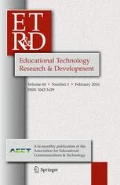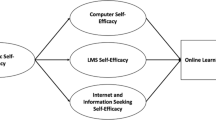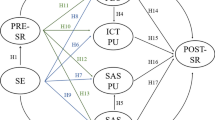Abstract
Effects of student motivation on performance in Web-based instruction (WBI) were examined. In particular, applicability of the self-efficacy theory to WBI contexts was tested. A total of 152 junior high school students in Seoul, Korea, participated in WBI during regular science classes. Participants completed motivational surveys before the onset of WBI and took the written and search tests at the end of WBI. Path analyses revealed that students' self-efficacy for self-regulated learning positively related to their academic self-efficacy, strategy use, and Internet self-efficacy. Academic self-efficacy predicted students' performance on the written test, which comprised problems on topics covered during the previous WBI sessions. Students' scores on the WBI search test were significantly and positively predicted by their self-efficacy in using the Internet. More interesting, students' academic self-efficacy beliefs were not able to predict their search test performance, whereas students' Internet self-efficacy beliefs were not able to predict their written test performance.
Similar content being viewed by others
References
Al-Khaldi, M.A., & Al-Jabri, I.M. (1998). The relationship of attitudes to computer utilization: New evidence from a developing nation.Computers in Human Behavior, 14, 23–42.
Bandura, A. (1977). Self-efficacy: Toward a unifying theory of behavioral change.Psychological Review, 84, 191–215.
Bandura, A. (1997).Self-efficacy: The exercise of control. New York: Freeman.
Bandura, A., & Schunk, D.H. (1981). Cultivating competence, self-efficacy, and intrinsic interest through proximal self-motivation.Journal of Personality and Social Psychology, 41, 586–598.
Betz, N.E., & Hackett, G. (1981). The relationship of career-related self-efficacy expectations to perceived career options in college women and men.Journal of Counseling Psychology, 28, 399–410.
Bong, M. (1997, March).Congruence of measurement specificity on relations between academic self-efficacy, effort, and achievement indexes. Paper presented at the annual meeting of the American Educational Research Association, Chicago, IL.
Bong, M. (1999).Role of self-efficacy and task-value in predicting college students' course performance and future enrollment intentions. Manuscript submitted for publication.
Bong, M., & Clark, R.E. (in press). Comparison between self-concept and self-efficacy in academic motivation research.Educational Psychologist.
Chen, M. (1986). Gender and computers: The beneficial effects of experience on attitudes.Journal of Educational Computing Research, 2(3), 265–282.
Cohen, R.J., Montague, P., Nathanson, L.S., & Swerdlik, M.E. (1988).Psychological testing: An introduction to tests & measurement. Mountain View, CA: Mayfield.
Ertmer, P.A., Evenbeck, E., Cennamo, K.S., & Lehman, J.D. (1994). Enhancing self-efficacy for computer technologies through the use of positive classroom experience.Educational Technology Research and Development, 42(3), 45–62.
Fetterman, D.M. (1998). Webs of meaning: Computer and Internet resources for educational research and instruction.Educational Researcher, 27(3), 22–30.
Hill, J.R., & Hannafin, M.J. (1997). Cognitive strategies and learning from the World Wide Web.Educational Technology Research and Development, 45(4), 37–64.
Horn, C., Bruning, R., Schraw, G., Curry, E., & Katkanan, C. (1993). Paths to success in the college classroom.Contemporary Educational Psychology, 18, 464–478.
Howard-Rose, D., & Winne, P.H. (1993). Measuring component and sets of cognitive processes in self-regulated learning.Journal of Educational Psychology, 85, 591–604.
Joo, Y.J., Lee, K.H., & Bong, M. (1998).Strategies for enhancing information literacy of female students. Seoul, Korea: Ewha Womans University.
Levine, T., & Donitsa-Schmidt, S. (1998). Computer use, confidence, attitudes, and knowledge: A causal analysis.Computers in Human Behavior, 14, 125–146.
Multon, K.D., Brown, S.D., & Lent, R.W. (1991). Relation of self-efficacy beliefs to academic outcomes: A meta-analytic investigation.Journal of Counseling Psychology, 38, 30–38.
Murphy, C.A., Coover, D., & Owen, S.V. (1989). Development and validation of the Computer Self-Efficacy scale.Educational and Psychological Measurement, 49, 893–899.
Owston, R.D. (1997). The World Wide Web: A technology to enhance teaching and learning?Educational Researcher, 26(2), 27–33.
Pajares, F. (1996). Self-efficacy beliefs in academic settings.Review of Educational Research, 66, 543–578.
Pajares, F., & Miller, M.D. (1994). Role of self-efficacy and self-concept beliefs in mathematical problem solving: A path analysis.Journal of Educational Psychology, 86, 193–203.
Pajares, F., & Miller, M.D. (1995). Mathematics self-efficacy and mathematics performances: The need for specificity of assessment.Journal of Counseling Psychology, 42, 190–198.
Pedhazur, E.J. (1982).Multiple regression in behavioral research: Explanation and prediction (2nd ed.). Fort Worth, TX: Holt, Rinehart and Winston.
Pintrich, P.R., & De Groot, E.V. (1990). Motivational and self-regulated learning components of classroom academic performance.Journal of Educational Psychology, 82, 33–40.
Pokay, P., & Blumenfeld, P.C. (1990). Predicting achievement early and late in the semester: The role of motivation and use of learning strategies.Journal of Educational Psychology, 82, 41–50.
Salomon, G. (1984). Television is ‘easy’ and print is ‘tough’: The differential investment of mental effort in learning as a function of perceptions and attitudes.Journal of Educational Psychology, 76, 647–658.
Santiago, R.W., & Okey, J.R. (1992). The effects of advisement and locus of control on achievement in learner-controlled instruction.Journal of Computer-Based Instruction, 19, 47–53.
Schunk, D.H. (1982). Effects of effort attributional feedback on children's perceived self-efficacy and achievement.Journal of Educational Psychology, 74, 548–556.
Schunk, D.H. (1983). Ability versus effort attributional feedback: Differential effects on self-efficacy and achievement.Journal of Educational Psychology, 75, 848–856.
Schunk, D.H. (1984). Sequential attributional feedback and children's achievement behaviors.Journal of Educational Psychology, 76, 1159–1169.
Schunk, D.H. (1991). Self-efficacy and academic motivation.Educational Psychologist, 26, 207–231.
Windschitl, M. (1998). The WWW and classroom research: What path should we take?Educational Researcher, 27(1), 28–33.
Young, J.D. (1996). The effect of self-regulated learning strategies on performance in learner controlled computer-based instruction.Educational Technology Research and Development, 44(2), 17–27.
Zimmerman, B.J. (1995). Self-efficacy and educational development. In A. Bandura (Ed.),Self-efficacy in changing societies (pp. 202–231). New York: Cambridge University Press.
Zimmerman, B.J., & Bandura, A. (1994). Impact of self-regulatory influences on writing course attainment.American Educational Research Journal, 31, 845–862.
Zimmerman, B.J., Bandura, A., & Martinez-Pons, M. (1992). Self-motivation for academic attainment: The role of self-efficacy beliefs and personal goal setting.American Educational Research Journal, 29, 663–676.
Zimmerman, B.J., & Martinez-Pons, M. (1988). Construct validation of a strategy model of student self-regulated learning.Journal of Educational Psychology, 80, 284–290.
Zimmerman, B.J., & Martinez-Pons, M. (1990). Student differences in self-regulated learning: Relating grade, sex, and giftedness to self-efficacy and strategy use.Journal of Educational Psychology, 82, 51–59.
Author information
Authors and Affiliations
Corresponding author
Additional information
This research is based on data collected as part of Ha-Jeen Choi's master's thesis completed at Ewha Womans University.
The authors thank Steven Ross and three anonymous reviewers for their helpful comments on earlier versions of this article.
Rights and permissions
About this article
Cite this article
Joo, YJ., Bong, M. & Choi, HJ. Self-efficacy for self-regulated learning, academic self-efficacy, and internet self-efficacy in web-based instruction. ETR&D 48, 5–17 (2000). https://doi.org/10.1007/BF02313398
Issue Date:
DOI: https://doi.org/10.1007/BF02313398




